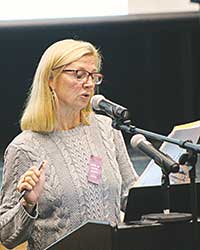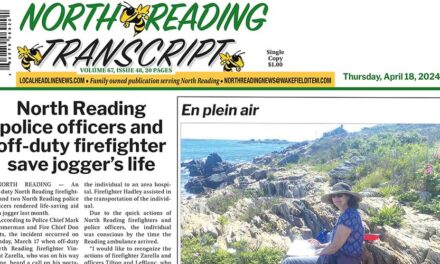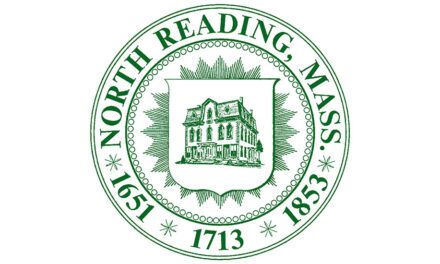Published in the October 18, 2018 edition
By MAUREEN DOHERTY
NORTH READING — Business owners on Main Street, long frustrated by the provision in the town’s 2002 bylaw requiring them to remove all snow from the sidewalks in front of their properties within 24 hours of the end of each storm or face hefty fines, have won a reprieve effective at the end of this current fiscal year when that requirement will be repealed. Just what will replace it — and when — remains to be seen.
The state has long told the town it will not be responsible for clearing snow from any of the sidewalks on Route 28 even though the patchwork quilt of sidewalks along this state highway lie within the state right-of-way.
The town maintains that it cannot plow more than the 12 miles of sidewalks it currently plows after storms because it does not have the manpower and still has just two sidewalk plows. The priority, according to DPW Director Patrick Bower, remains those areas closest to the town’s schools where students are required to walk to school or walk to school bus stops, followed by the residential frontage along Main Street.
The funds spent on a new sidewalk plow this year were needed to replace one of the town’s two sidewalk plows, which was beyond repair, Town Administrator Michael Gilleberto said at Monday’s Town Meeting.
The business owners remain perplexed when they see the town’s sidewalk plow remove snow in front of residential complexes like Greenbriar Condominiums on Route 28 and then skip a strip that fronts on commercial property to jump down to the next stretch of residential frontage, leaving a patchwork of accessible and inaccessible areas in which to walk.
The debate had ramped up last year at this time when the Select Board met with the business owners to roll out how the $300 per day fine for violators authorized at the June 2017 Town Meeting would be implemented.
The threat of the fines appeared to be working as the Police Department reported a 95% compliance rate with the bylaw during the winter of 2017-18.
Business after business reported the hardships they faced because of it. One owner of a small office building with several storefronts reportedly spent $3,000 last winter just making sure the snow was removed from her frontage.
Chuck Carucci, who has lived on the corner of Chester and Main Streets for 55 years and who owns the Temple Gas Station on the opposite corner at 290 Main Street, recalled an incident one winter about 15 years ago when a man who slipped and fell in front of his house, breaking his leg, made an insurance claim against him. Business owners face this same reality.
John Magazzu, who owns the strip mall with small offices above it at the corner of 4 Lowell Road and Main Street — where Routes 62 and 28 intersect — said he clears his frontage and sidewalk but it does little good when at both ends of his property he runs into eight-foot high mounds of snow placed there by the commercial abutter on Main Street and a residential abutter on Lowell Road. The bylaw requirement to remove the snow only applies to the “tenant, occupant, owner” of non-residential property. Magazzu added if he does not pay to have it removed his tenants get harassed by the town to remove it.
An attempt to fix the bylaw last June never materialized between the board and the business owners. This fall, the board used Article 20 as a placeholder to potentially amend General Bylaw “158-9 Snow Removal on Streets and Sidewalks,” but with no amendments proposed they chose to pass over it.
Concurrently, the business owners submitted a citizens’ petition under Article 21 seeking to remove all of the requirements of the bylaw, which would have wiped out two other portions of it that most people do not take issue with — the requirement that the owner of a non-residential property located within 15 feet of a street or sidewalk prevent snow and ice from falling off a roof and onto a street or sidewalk, and the prohibition on everyone — commercial or residential— barring them from placing snow and ice back onto a street or sidewalk that has already been cleared or plowed for travel.
Pat Lee, one of the presenters of the citizens’ petition under Article 21 in the warrant, seeking to repeal the bylaw, proposed an amendment on Town Meeting floor that would only repeal section A —that singles out business owners — while retaining and renumbering the other two provisions. If this version had passed, it would have taken effect immediately, meaning with no plans by the town or the state to pick up the slack, it would be up to each commercial property owner to decide whether to remove that snow this coming winter.
In the end, after the debate had gone on for nearly an hour, Martha Johnson of 9 Oscar’s Way, proposed an additional amendment to Lee’s — to delay the implementation of the repeal of section A until the the start of the next fiscal year, July 1 2019. She was applauded. This means that the town can still fine a commercial property owner $300 per day for noncompliance this coming winter while buying some time for some sort of compromise to be worked out.
Lee described how it is virtually impossible to keep up with the amount of ice and snow deposited onto private property by the MassHighway plows responsible for clearing four travel lanes on Route 28.
Lee said he has tried to do it himself only to get hit by all sorts of slush and debris when standing that close to passing cars. He said it is too dangerous for him to send his young workers outside to do it. “We don’t have the right equipment. It’s not safe out there,” he said.
“This was well-intended because we wanted to create for the town safe pathways throughout town for pedestrians but it’s not happening because as much as the businesses try to comply they don’t have the equipment to do it properly. One business will do it well and they you go down two or three businesses and it is not done well and it is not safe to travel,” Lee said.
Co-presenter Eric Evans made a slide show of photos, many dated from last winter’s storms, and described the challenges faced by the businesses to illustrate these points. One even showed a pedestrian walking in the Rte. 28 travel lane near Winter Street with a mound of snow twice as tall as she was in the background.
Lee added that the police were “very professional” when they came to business properties trying to get compliance with the bylaw. “I don’t know if it was the best use of their manpower but they’ve done a great job doing it,” he said.
But he also said that many in the business community feel that they are not getting a lot in return for their tax dollars if they cannot get a service such as sidewalk plowed in front of their businesses — and these are the same businesses that support the local nonprofits and school groups and churches throughout the year.
Sean Delaney spoke up later in the meeting to point out that those businesses that happen to be fortunate enough to be located on a walking path to one of the town’s schools, such as along Route 62 in the town center, don’t have to worry about paying to plow their sidewalks or paying a fine because the town does it for them.
Select Board member Andy Schultz suggested that perhaps some of the sidewalks that are plowed by the town or the town’s contractors could be re-assigned. For instance, he did not see the point in plowing the sidewalk in front of the Hillview golf course even though it is town property.
Select Board member Steve O’Leary pointed out the amount of money the town already spends to remove snow from every street each winter — upwards of $300,000 to $500,000 — without the added responsibility of plowing the full length of Main Street. He cautioned that if the townspeople expect to have the town take on this added responsibility in the years to come then they need to understand that this line item will go up significantly in the coming budget seasons.
Article 21, as amended, passed nearly unanimously on a voice vote.








